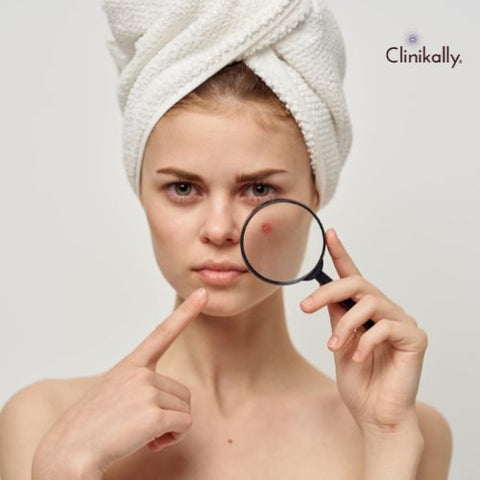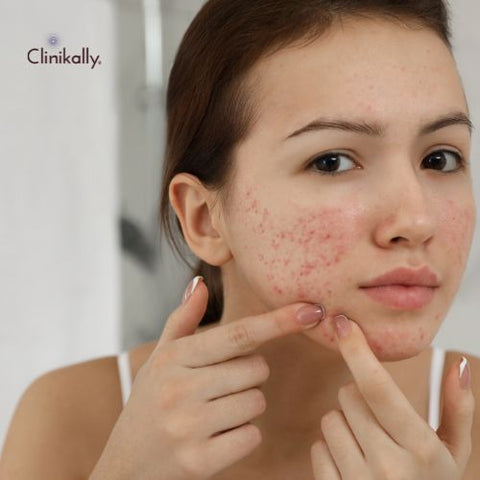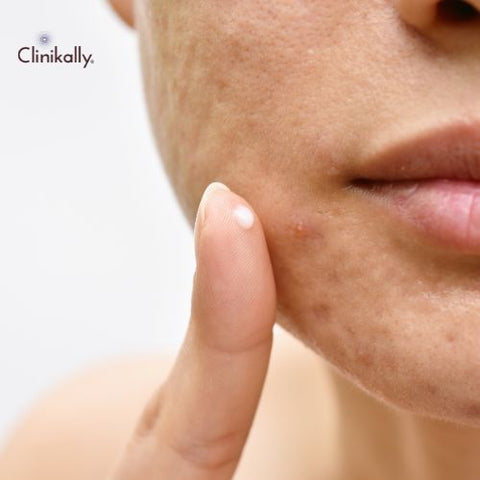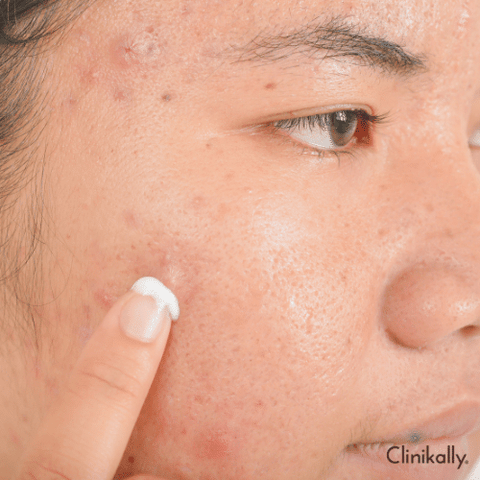Doxycycline is an antibiotic that is commonly used to treat acne. It works by preventing bacterial growth and multiplication and is a member of the tetracycline antibiotic family. In cases of moderate to severe acne, doxycycline may be an effective treatment. It has anti-inflammatory properties and stops Propionibacterium acnes (P. acnes) from growing. However, it is crucial to follow the medication's instructions precisely and to be aware of any possible side effects and precautions.
Introduction

Acne treatments can be time- and labour-intensive. If you've seen a dermatologist (skin specialist), you may have heard of doxycycline or even had it prescribed as part of a skincare routine. Let's discuss what you need to know about doxycycline, which is a well-known acne medication. Doxycycline is an antibiotic, which means that it kills bacteria. It belongs to a group of antibiotics called tetracyclines. The other two medications in this group are tetracycline and minocycline. Although we don't know which antibiotics are more potent than others, your doctor will work with you to find the most effective course of action. Minocycline and doxycycline are more frequently prescribed than tetracycline due to their fewer side effects (such as upset stomach) and less frequent dosing requirements.
Understanding Acne
Acne is a skin condition that affects millions of people around the world. It happens when hair follicles become clogged with oil and dead skin cells, causing pimples, blackheads, and whiteheads to form. Acne is most frequently linked to adolescence, but it can happen at any age and has a big impact on a person's self-esteem and quality of life. Numerous factors, such as genetics, hormonal changes, and specific medications, can contribute to acne. Hormonal changes during puberty, pregnancy, and menstruation can cause an increase in sebum production, an oily substance that helps lubricate the skin. When sebum combines with dead skin cells and bacteria, it can clog pores and cause acne. The following additional elements can also affect the occurrence of acne, in addition to hormonal changes:
-
Poor skincare: Skipping a face wash can cause an accumulation of oil and dead skin cells, which raises the possibility of developing acne.
-
Diet: Consuming a diet that is high in sugar and refined carbohydrates may help acne develop.
-
Stress: Excessive amounts of stress can cause hormonal imbalances and inflammation, both of which can exacerbate acne.
-
Medication: Corticosteroids are one type of medication that can make acne more likely.
What is Doxycycline?
Doxycycline is a broad-spectrum antibiotic in the tetracycline class of antibiotics. It's used to treat bacterial infections like respiratory infections, urinary tract infections, and sexually transmitted infections. Doxycycline stops bacteria from assembling necessary proteins, which restricts their capacity to expand and multiply. Doxycycline, which has antimicrobial and anti-inflammatory properties, is also used to treat acne. It works by inhibiting the growth of Propionibacterium acnes (P. acnes), one of the main causes of acne. Furthermore, it has anti-inflammatory properties that can aid in the reduction of acne-related inflammation. Doxycycline is usually taken orally as tablets or capsules. On a daily basis, it is typically taken once or twice, with or without food, as prescribed by a doctor. The dosage and length of treatment may vary depending on the kind and severity of the infection being treated. Doxycycline, like all antibiotics, can have side effects. Common doxycycline side effects include nausea, diarrhea, stomach upset, and photosensitivity. Severe skin reactions, liver damage, and allergic reactions are all possible side effects. If any severe side effects occur, contact a healthcare provider immediately.
How Doxycycline Works for Acne?
Doxycycline treats acne by focusing on its two key components: bacterial development and inflammation. Propionibacterium acnes (P. acnes) is a type of bacteria that lives on the skin's surface and inside hair follicles. Inflammation and the growth of pimples, whiteheads, and blackheads happen as a result of P. acnes' preference for the oily conditions of hair follicles. As a broad-spectrum antibiotic, doxycycline works by halting bacterial growth and reproduction, including P. acnes. By lowering the number of bacteria on the skin, doxycycline reduces inflammation and stops the development of new pimples. In addition to having antimicrobial properties, doxycycline also has anti-inflammatory properties that make it useful for treating acne. Acne is an inflammatory condition, and P. acnes can cause an immune reaction that leads to inflammation and the development of pimples. By reducing inflammation, doxycycline can aid in reducing the redness, swelling, and discomfort brought on by acne.
Using Doxycycline for Acne Treatment

You must carefully follow any instructions given by your doctor if they have prescribed doxycycline for the treatment of your acne. When taking doxycycline for acne treatment, it is critical to carefully follow your healthcare provider's instructions. Even if your acne has improved, do not stop taking the medication without first consulting your doctor. Stopping the medication too soon can result in a relapse of acne.
Types of Acne Treated with Doxycycline
When other therapies, such as topical medications, have failed to control the condition, doxycycline is frequently used to treat moderate to severe acne. Doxycycline can be used to treat the following types of acne:
-
Inflammatory acne: This type of acne is characterized by pimples that are red, swollen, painful, and sometimes tender to the touch. P. acnes bacteria frequently contribute to this type of acne by inducing an inflammatory immune response. Doxycycline can aid in reducing P. acnes growth and the resulting inflammation, which will decrease inflammatory acne.
-
Papules and pustules: These small, raised bumps on the skin are frequently filled with pus. These particular acne lesions are brought on by an accumulation of dead skin cells, bacteria, and oil in the hair follicles. Doxycycline can help reduce the bacterial growth and inflammation associated with papules and pustules, leading to a reduction in their size and number.
-
Nodular and cystic acne: Nodular and cystic acne are severe forms of acne that are characterized by large, painful, and deep-rooted pimples. These types of acne lesions are often resistant to other treatments, such as topical medications. The severity of nodular and cystic acne can be lessened by using doxycycline to help reduce the inflammation and bacterial growth associated with these conditions.
-
Acne rosacea: Acne rosacea is a long-term inflammatory skin condition that causes facial flushing, redness, and small bumps. As it can aid in reducing inflammation and bacterial growth connected to this condition, doxycycline is frequently prescribed in low doses for the treatment of acne rosacea.
Dosage and Prescription
The amount of doxycycline prescribed and the severity of the acne will depend on these factors as well as the patient's medical history. Here are some general recommendations for doxycycline dosage and prescription for acne:
-
Dosage: Doxycycline is usually taken once or twice a day, depending on the severity of the acne and the dosage prescribed by the doctor. The typical daily dose ranges from 50mg to 100mg.
-
Timing: Doxycycline can be taken with or without food, but it is critical to take it at the same time each day to ensure consistent blood levels.
-
Duration of treatment: The length of treatment will be determined by the severity of the acne and the effectiveness of the medication. Doxycycline treatment usually lasts several weeks or months.
-
Precautions: Doxycycline can make you more sensitive to sunlight, so wear sunscreen and avoid prolonged sun exposure. It is also critical to avoid taking doxycycline with milk or other dairy products, as these can interfere with the medication's absorption.
-
Follow-up: While taking doxycycline for acne treatment, it is critical to see your doctor on a regular basis. This is done to monitor the medication's effectiveness and to keep an eye out for any potential side effects.
Potential Side Effects
Like all medications, doxycycline can cause potential side effects. The following are a few of the most typical negative effects of doxycycline:
-
Gastrointestinal upset: Doxycycline can cause stomach upset, such as nausea, vomiting, and diarrhea.
-
Photosensitivity: Doxycycline may increase a person's skin's sensitivity to sunlight, which increases their risk of getting sunburned and causing skin damage. When taking doxycycline, it's critical to use sunscreen and stay out of the sun for as long as possible.
-
Yeast infections of the vagina: Doxycycline can upset the normal bacterial balance in the vagina, which can result in a yeast infection.
-
Enamel hypoplasia and tooth discoloration: If Doxycycline is taken by children under the age of 8, it can result in underdeveloped teeth and enamel hypoplasia (permanent tooth discoloration).
-
Rare but severe side effects: Doxycycline can occasionally result in severe side effects like liver damage, severe allergic reactions, and elevated intracranial pressure.
Alternatives to Doxycycline for Acne

While doxycycline is an effective treatment for acne, there are also several alternatives that may be considered. Here are some common alternatives to doxycycline for acne:
-
Minocycline: Minocycline is a different tetracycline antibiotic that is frequently used to . It functions similarly to doxycycline by reducing inflammation and eradicating acne-causing bacteria.
-
Tetracycline: Tetracycline is an antibacterial that was first used to treat acne. The availability of more recent antibiotics like doxycycline and minocycline, however, has made them less popularly used today.
-
Azithromycin: Azithromycin is a macrolide antibiotic that can also be used to treat acne. It works by reducing inflammation and killing bacteria that cause acne.
-
Topical treatments: There are a number of topical treatments for acne in addition to oral antibiotics. These include topical antibiotics like clindamycin, retinoids, and benzoyl peroxide.
-
Hormonal therapies: For women, hormonal therapies like spironolactone and birth control pills may be successful in treating acne.
Over-the-Counter Products for Acne
There are several over-the-counter (OTC) products available that can be used to treat mild to moderate acne. Here are some common OTC products for acne:
-
Benzoyl peroxide: This topical acne treatment works by eradicating acne-causing bacteria and reducing inflammation. It is offered in gels, creams, and lotions with strengths ranging from 2.5% to 10%.
-
Salicylic acid: Salicylic acid, a beta-hydroxy acid, exfoliates the skin and clears clogged pores. It can be found in cleansers, toners, and spot treatments in strengths ranging from 0.5% to 2%.
-
Retinoids: Retinoids, which are vitamin A derivatives, increase cell turnover and prevent the accumulation of oil and dead skin cells in the pores by accelerating cell turnover. They are offered in creams, gels, and lotions with strengths ranging from 0.025% to 0.1%.
-
Sulfur: Sulfur is a mineral that occurs naturally and has the ability to unclog pores and reduce inflammation. It can be found in cleansers, masks, and spot treatments in strengths ranging from 3% to 10%.
-
Tea tree oil: Tea tree oil functions as a natural antiseptic by eradicating acne-causing bacteria. It comes in creams, gels, and spot treatments with concentrations ranging from 5% to 10%.
Prescription Medications for Acne
Prescription medications may be necessary for moderate to severe acne or acne that has not responded to OTC treatments. Here are some common prescription medications for acne:
-
Topical antibiotics: Topical antibiotics like erythromycin and clindamycin work by eradicating the acne-causing bacteria from the skin. They come in creams, gels, and lotions, and are typically combined with other topically applied or orally taken medications.
-
Topical retinoids: Topical retinoids like tretinoin, adapalene, and tazarotene work by accelerating cell turnover and preventing the buildup of dead skin cells and oil in the pores. They come in creams, gels, and lotions and can irritate and dry out the skin.
-
Oral antibiotics: Antibiotics taken orally, such as doxycycline, minocycline, and tetracycline, work by thinning the inflammation and eradicating the acne-causing bacteria. They are frequently prescribed in conjunction with topical medications and are typically used for moderate to severe acne.
-
Hormonal treatments: Hormonal treatments like birth control pills and spironolactone may be effective in treating acne in women. They work by regulating hormones that can contribute to acne.
-
Isotretinoin: Isotretinoin, also known by the brand name Accutane, is a potent oral medication used to treat severe acne that has not responded to other therapies. It works by reducing the size of the sebaceous glands and reducing the production of sebum. Isotretinoin has potentially serious side effects and requires close monitoring by a healthcare provider.
Acne Prevention and Management Tips
In addition to using medications to treat acne, there are several steps you can take to prevent and manage acne:
-
Use a gentle cleanser to wash your face twice daily to get rid of makeup, oil, and dirt.
-
Squeezing or picking at acne increases the risk of scarring and the spread of bacteria to other areas of the face.
-
Scrubs, astringents, and harsh soaps can irritate the skin and exacerbate acne. Avoid harsh, comedogenic products.
-
To keep your skin moisturized and to avoid dryness, use a non-comedogenic moisturizer.
-
To protect your skin from the damaging rays of the sun, use a broad-spectrum sunscreen with an SPF of 30 or higher.
-
Stress can contribute to acne by increasing inflammation and hormone production. Try stress-reduction exercises like yoga, meditation, or deep breathing.
-
A healthy diet can help to promote overall skin health even though there is no direct connection between diet and acne. Consume a diet that is well-balanced and full of fresh produce, whole grains, and lean protein.
-
Regular exercise can lower stress and enhance skin health in general.
Talking to Your Doctor About Doxycycline for Acne

If you are considering using doxycycline to treat your acne, it is important to discuss this with your doctor. Your doctor can provide you with guidance and advice on whether doxycycline is a suitable option for you and how to use it safely and effectively. You can discuss the following with your doctor or online dermatologist: your medical history; the severity of your acne; the dosage and duration of the medication; any side effects; and future appointments. It is important to follow your doctor's instructions carefully when using doxycycline to treat acne.
Medical Consultation and Evaluation
Your overall health and well-being are ensured through medical consultation and evaluation, which are crucial steps. You can anticipate the following during medical consultation and evaluation:
-
Medical history: Your doctor will inquire about your past medical history, including any illnesses or injuries, any prescription drugs or dietary supplements you may be taking, and any family medical history.
-
Physical examination: To look for any symptoms of a disease or illness, your healthcare provider may conduct a physical examination. This might entail taking your temperature, heart rate, blood pressure, and other vital signs.
-
Laboratory tests: In order to rule out particular medical conditions, your doctor might order certain laboratory tests. These could involve imaging tests like X-rays or CT scans, as well as blood and urine tests.
-
Diagnosis and treatment plan: Based on your medical history, physical examination, and test results, your healthcare provider will make a diagnosis and develop a treatment plan. This may include medications, lifestyle changes, or further testing and evaluation.
-
Follow-up appointments: In order to track your development and make any necessary modifications to your treatment plan, your healthcare provider may schedule follow-up appointments.
Safety Considerations and Precautions
To protect yourself from potential harm or injury, it is crucial to take safety precautions and considerations. Following are some general safety suggestions and measures to remember:
-
Follow instructions: Always follow instructions carefully for any medication or treatment you are using. This includes adhering to any additional instructions provided by your healthcare provider, using medical equipment correctly, and taking medications as directed.
-
Keep track of your medications: Keep track of all medications you are taking, including over-the-counter medications and supplements. Because some medications may interact with one another, be sure to tell your healthcare provider about all the medications you are taking.
-
Practice safe sex: If you engage in sexual activity, engage in safe sex to lower your risk of STIs and unintended pregnancies. When necessary, use condoms and other types of protection.
-
Wear protective gear: If you are participating in sports or other activities that could result in injury, wear appropriate protective gear. This may include helmets, knee pads, or other protective equipment.
-
Maintain proper hygiene: Maintain proper hygiene to stop the spread of infections and germs. This entails frequently washing your hands, covering your mouth and nose when you cough or sneeze, and keeping a distance from people who are ill.
-
Get vaccinated: Maintain current vaccination records to safeguard yourself against diseases that can be prevented by vaccination.
-
When necessary, seek medical attention: If you experience any strange symptoms or side effects from medication or treatment, do not wait to see a doctor.
Follow-Up Care and Monitoring
Making sure you receive the right medical attention and support for your condition requires monitoring and follow-up care. Here are some general guidelines for follow-up care and monitoring:
-
Follow-up appointments: In order to track your development and make any necessary modifications to your treatment plan, your healthcare provider may schedule follow-up appointments. It is crucial that you keep these appointments and let your healthcare provider know if your symptoms or health situation change.
-
Regular check-ups: Your healthcare provider may advise regular check-ups to monitor your general health and well-being, depending on your health condition. This could involve standard blood tests, imaging analyses, or other diagnostic exams.
-
Medication management: If you need to take medication for your health condition, your doctor may keep track of your usage and change your prescription or dosage as necessary.
-
Changes in lifestyle: Your healthcare provider may suggest changes in lifestyle to help manage your symptoms and enhance your general health, depending on your health condition. This might entail modifying your eating habits, exercise routine, or other practices.
-
Support resources: To help you manage your health condition and enhance your quality of life, your healthcare provider may suggest support resources like support groups, counselling, or other services.
Conclusion

You can significantly enhance your general health and well-being by seeking medical advice and evaluation. During the consultation and evaluation process, your healthcare provider will take into account your medical history, carry out a physical examination, request any necessary laboratory tests, make a diagnosis, and create a treatment plan specific to your needs. To ensure your safety, adhere to instructions, monitor your medications, practice safe sex and good hygiene, wear appropriate protective gear, get recommended vaccinations on time, and seek medical attention when necessary. You can manage your health and enhance your quality of life by keeping in touch with your healthcare provider for routine checkups, medication management, and lifestyle changes. Remember to be open and honest with your healthcare provider about any worries or questions you may have in order to receive the best medical care and support.
































